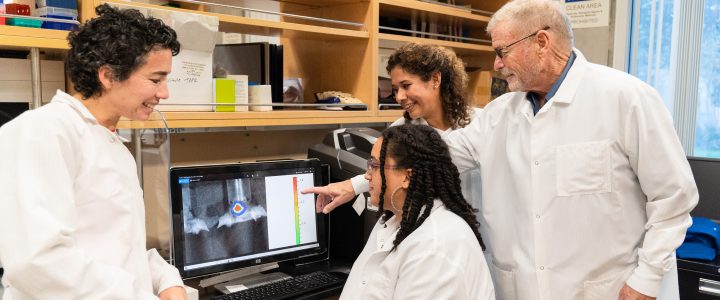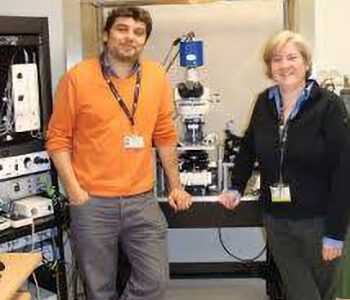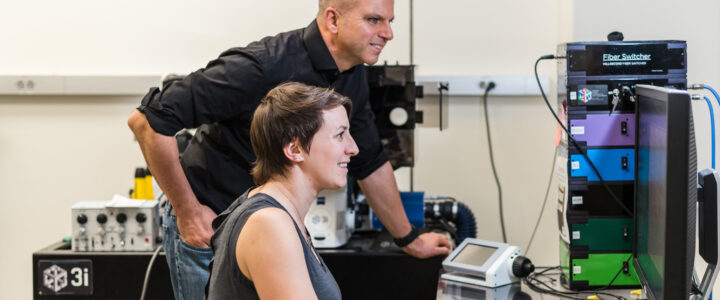This team’s ultimate goal is to find a way to restore full function of FMR1, the gene which underlies Fragile X syndrome. With this grant, they will use advanced technologies to find the specific proteins that are involved in keeping FMR1 silenced. Understanding precisely why and how the gene is silenced is a key step toward finding a solution.
Read moreDisease Mechanisms
C-subunit Mitochondrial Leak Channel in Fragile X Syndrome

Explore Yale’s groundbreaking study on mitochondrial leak channels, set to revolutionize Fragile X syndrome treatment. Funded by a $100,000 FRAXA grant.
Read moreModeling Fragile X Syndrome using Multi-Region Human Brain Organoids

Discover groundbreaking research at UCI by Dr. Watanabe and Dr. Tsai. Using cutting-edge organoid technology, they’re modeling Fragile X brain function and advancing potential treatment testing.
Read moreTargeting Cognitive Function in Fragile X Syndrome

It has long been assumed that the differences between males and females with Fragile X were simply a matter of degree, with males being more severely affected. But gender differences may be far reaching. This team is working to understand imbalances in how the brain’s neurons transmit signals, with a focus on how differently males and females learn and experience anxiety. They are studying two neuronal pathways which are promising targets for treatment.
Read moreHuman FMR1 Isoform-Specific Regulation of Translation and Behavior

Fragile X syndrome is caused by lack of one protein, FMRP. But this one protein occurs in different variations. Do the different versions of FMRP have different roles in the brain, and if so, is there one that’s key? If we could replace FMRP to treat Fragile X syndrome, which version would we use?
Read moreFunctional and Genomic Characterization of Interneurons in the Fmr1-KO Mouse Brain

The brain’s balance is maintained by two types of neurons: those that excite and those that inhibit activity. Like yin and yang, this balance is essential. This team has found fewer than normal inhibitory cells in the brains of Fragile X mice. They are now working to pinpoint this abnormality and find ways to restore the normal balance and function.
Read moreCharacterization and Modulation of microRNAs in Fragile X Syndrome

Could microRNAs be a new path to treatment of Fragile X syndrome? MicroRNAs are disrupted in Fragile X, and so this team will work to understand what is going wrong and explore ways to correct it with drugs which directly target microRNAs.
Read moreCorrecting Fragile X Syndrome Deficits by Targeting Neonatal PKCε Signaling in the Brain

With this $90,000 grant from 2017-2018, Dr. Banerjee’s team has shown that enhancing PKCε can correct brain development and abnormal behaviors in Fragile X knockout mice and had their findings published in PubMed.
Read moreGABA-A Receptor in Fragile X Syndrome

With $210,000 in grants from FRAXA over 1999-2010, Dr. Frank Kooy has studied the involvement of the GABAergic system in Fragile X syndrome, at the University of Antwerp, Belgium.
Read moreThe Role of Astrocyte BMP Signaling in Fragile X Syndrome

Astrocytes are star-shaped cells that make up one fifth of all cells in the human brain. Recently researchers found a specific pathway in astrocytes that is overactive in Fragile X syndrome, and they hope to bring this pathway back to normal with a drug. With this grant, the team will try to correct the pathway in Fragile X mice. The hope is that they will find a new potential treatment approach for Fragile X syndrome.
Read moreCellular-Specific Therapeutic Targeting of Inhibitory Circuits in Fragile X Syndrome

Studies have shown that the function of inhibitory networks is disturbed in Fragile X. This abnormality is not well understood but appears to be secondary to abnormalities in metabotropic glutamate and endocannabinoid systems. With a $90,000 grant from FRAXA, Dr. Molly Huntsman’s team examined how these networks interact and how inhibitory deficits can best be remedied.
Read moreAuditory Dysfunction in Fragile X Syndrome in a Mouse Model of Fragile X

With a $90,000 grant from FRAXA, Dr. McCullagh and Dr. Achem Klug at the University of Colorado investigated whether auditory neural circuits are altered in Fragile X mice. They saw minor differences in these mice compared to B6 (control) mice in several measures of auditory acuity. Fmr1 mice had increased latency to the startle response for almost all conditions compared to B6 mice, suggesting altered timing to acoustic cues. These experiments show that, consistent with patient reports and anatomical/physiological data, the auditory system is altered in a mouse model of FXS, though with some potential compensation leading to a subtle behavioral impact.
Read moreCholesterol-Dependent Changes in Fragile X Astrocytes

FRAXA Research Foundation has awarded $45,000 to Dr. Maija Castrén, of the University of Helsinki, Finland. Dr. Castren is working with Dr. Iryna Ethell, at the University of California at Riverside, to uncover mechanisms behind beneficial effects of lovastatin and cholesterol-dependent changes seen in the Fragile X brain.
Read moreDeep Molecular Profiling of Fragile X Mouse and Human Cells

FRAXA Research Foundation has awarded $90,000 to Dr. Joel Richter, Principal Investigator, and Dr. Sneha Shah, Postdoctoral Fellow, at the University of Massachusetts Medical School. They are using human induced pluripotent stem (iPS) cells to analyze gene expression in Fragile X syndrome.
Read moreTargeting Mitochondria in Human Fragile X Syndrome Neurons

FRAXA Research Foundation has awarded a $90,000 research grant to principal investigator Dr. Xinyu Zhao and postdoctoral fellow Dr. Minjie Shen at the University of Wisconsin. They are investigating whether drugs which boost mitochondria — which provide the energy for cells — could treat Fragile X syndrome. Dr. Zhao explains in this video.
Read moreCorrecting Sensory Processing in Fragile X Mice by Modulating Kv3.1

FRAXA awarded a $90,000 grant to Carlos Portera-Cailliau, PhD and Nazim Kourdougli, PhD at UCLA to investigate whether a novel drug can rescue sensory processing deficits in Fragile X mice. People with Fragile X have similar problems in sensory processing. This new drug acts on Kv3.1, a promising Fragile X treatment target also being pursued by UK-based Autifony Therapeutics based on FRAXA-funded research done at Yale.
Read moreDevelopmental Profile of Glutamatergic Synapses in Fragile X

FRAXA Research Foundation awarded a $90,000 research fellowship to Dr. Tue Banke. With this award, Dr. Banke investigate how glutamate receptors at neuronal synapses – essential building blocks of learning and memory – are impacted in Fragile X syndrome.
Read moreEnhancing NMDA Receptor Signaling to Treat Fragile X Syndrome

Dr. Stephanie Barnes investigated the role of NMDA receptors as a FRAXA Postdoctoral Fellow in Dr. Emily Osterweil’s laboratory at the University of Edinburgh from 2016-2018. With an additional year grant from FRAXA, she then continued her work to identify novel targets and test pharmacological therapies in the Fragile X mouse model at the Picower Institute at MIT with Dr. Mark Bear. Results published.
Read moreScreening 2,320 FDA-Approved Drugs for Potential Treatment of Fragile X

FRAXA Research Foundation has awarded a $90,000 grant to Principal Investigator Dr. Sean McBride and Postdoctoral Fellow Dr. Karen Joyce, at Rowan University, to screen all 2,320 FDA-approved drugs on both mouse and fly models of Fragile X syndrome. Those drugs which show promise will be tested in more detail for potential to treat Fragile X in humans.
Read moreNovel Modulators of Potassium Channels to Treat Fragile X

With funding from FRAXA over 2015-2017, the Yale University team of Leonard Kaczmarek, PhD showed that the firing patterns of auditory neurons in response to repeated stimulation is severely abnormal in Fragile X mice. Based on these results, they are collaborating with the UK-based company Autifony to develop advanced compounds which may reverse these deficits.
Read moreCoffee, Tea, and Chocolate: Adenosine Receptors in Fragile X

Caffeine is the most popular smart drug in the world. With a $90,000 grant from FRAXA Research Foundation, Alberto Martire, PhD and Antonella Borreca, PhD in Rome, Italy are investigating adenosine receptors antagonists to treat Fragile X syndrome. Compounds which are able to block adenosine receptors are commonly found in tea, chocolate, and coffee.
Read moreResearch Points to Drugs which Inhibit PDE to Treat Fragile X

FRAXA Research Foundation funded a grant of $90,000 over 2016-2018, for a postdoctoral fellowship for Thomas Maurin, PhD, working under the mentorship of Dr. Barbara Bardoni at INSERM in France. The team works on the biochemistry of the Fragile X protein. They have found that PDE inhibitors (a class of drugs) show promise as treatments for Fragile X syndrome. In related research, FRAXA is currently funding a clinical trial of PDE4D inhibitors.
Read moreMetformin and Aberrant Insulin Signaling in a Fragile X Mouse Model

This 2017-2018 grant of $90,000 is funded jointly by FRAXA and the Fragile X Research Foundation of Canada for the first year. A previous FRAXA grant to the Sonenberg lab has led to great interest in the available drug, metformin, as a potential treatment for Fragile X syndrome. FRAXA is currently organizing clinical trials of metformin.
Read moreNon-Invasive Imaging as a Biomarker for Fragile X Clinical Trials

FRAXA Research Foundation has renewed Kamila Castro’s 2017 FRAXA Fellowship for a second year. With this $90,000 award, Kamila Castro and Principal Investigator Dr. Andreas Frick are using non-invasive magnetic resonance imaging (MRI) methodology to assess connectivity changes in the brain in Fragile X. If this project is successful, we will have objective outcome measures to evaluate new treatments, both in mice bred to mimic Fragile X and in human patients.
Read moreActivity-Dependent Translational Profiling in Fragile X Neurons

FRAXA’s first-ever grant to researchers at the University of California at Berkeley goes to Dr. Nicholas Ingolia and Dr. J. Wren Kim to analyze the proteomics of Fragile X neurons using a newly developed tool which can distinguish the profiles of neurons that are actively responding to signals.
Read more
